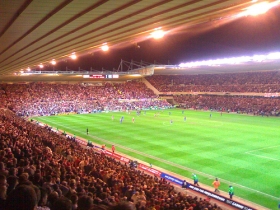The Forgotten 3rd club
The Forgotten 3rd club

A more learned man than me once said that if all of the world were to collate each of their problems into one pile, each and every man would rather take his own home again, than take a portion from the common stock.
I’m in no position to give this quote any real credibility considering I first heard it from Ricky Gervais, but I’m fairly certain it holds a degree of relevance to the state of football in the North-East of England. Whilst the difficulties facing both Newcastle and Sunderland have received extensive media coverage over the last five or so years, Middlesbrough’s demise has gone largely unmentioned.
It’s difficult to pinpoint how, when and even why the rot set in at Boro. Unlike the perennial basket case across the river Tyne, there has been no trend of financial mismanagement or disastrous managerial appointments that have led them to this position. And whereas Sunderland have had their own questionable policy decisions leading to hot-headed Italian megalomaniac’s being appointed, Middlesbrough again lacked any of this madness. Its easy to think of the club as the North-Easts even-more-difficult third album. The North-East’s very own “Be Here Now”. But it was not always so.
Back in 2006, next-big-up-and-coming-hot-new-thing-on-the-block Steve McLaren was leading the side out against Sevilla to contest a European final. His appointment had been, one of many, shrewd decisions by Chairman Steve Gibson and a side containing the likes of Viduka, Hasselbaink and Downing were firmly established as Premier League regulars. The season was encapsulated by moments such as Maccarone’s thrilling 89th minute winner against Steaua Bucharest en route to the Uefa Cup Final in Eindhoven. Despite the euphoria of such occasions, certain periods throughout the season were certainly tumultuous, with McLaren under pressure to sign a new deal and coming under scrutiny from factions of the Middlesbrough support. He signed his new deal in January 2006 but doubts remained as he was brought into contention for the vacant England managers post. In the event, Middlesbrough upset the odds and progressed to their first major European Final, success which It could be argued accelerated McLaren’s departure from Teesside. I’m by no means implying that correlation necessarily means causation, but thereafter Middlesbrough would not see the same degree of success. The summer following McLaren’s was one free of major upheaval, due to Gibson’s decision to promote from within and appoint Gareth Southgate. Southgate receiving special dispensation to allow to manage the side despite not holding the requisite coaching qualifications. The playing staff remained largely the same and the arrival of hometown boy Jonathan Woodgate on loan from Real Madrid helped retain a sense of familiarity. The £6million fee for centre-back Robert Huth was befitting of a club who had made a European final the season previous but this was the extent of the spending.
Subsequent transfer windows reaped little obvious reward. The signing of Afonso Alves, flying in the face of the caution urged when recruiting from the Dutch leagues, proved an expensive mistake. It is difficult to label Alves as the party solely responsible for Middlesbrough’s subsequent decline in performance. Indeed, a 13th place finish and 6 goals in 14 games for Alves is a handy return, but when such a signing fails to hit the heights perhaps expected of them he can soon become emblematic of such a struggle.
Before relegation in May 2009, Boro’s transfer dealings again left much to be desired. With a net spend effectively of nil during the summer transfer window of 2008. The arrivals of Marvin Emnes and Didier Digard did little to ignite the passions of the Middlesbrough support and popular midfielder George Boateng departed for Hull City. The commitment of the Middlesbrough support also became a contentious issue between the board and those in attendance at the Riverside. Whilst the supporters feared the club becoming stagnant, Chief Exec Kieth Lamb was notoriously outspoken on what he perceived to be a level of apathy amongst the people of Teesside. Attendances had seen a steady decline since the 2004-2005 season but it could be reasonably argued so had the team and whether it ought to be this way or not, that is often the nature of the beast.
It cannot be said definitively to what degree Lamb was misquoted when he claimed Middlesbrough would get “the team it can afford.” But such remarks contributed to what became a self-fulfilling prophecy. The more often such quotes were misinterpreted, the more unpopular he became, and the more unpopular he became, the more his words would be twisted to meet certain agendas. Since Steve Gibson had become such a hero on Teesside when rescuing the club from the brink of extinction, he was rarely implicated in any discussion of the club’s downturn in fortunes. The Chief Executive can easily catch the ire of supporters as a midpoint between the chairman and the managers he employs. With a chairman achieving such a cult status and managers being too expendable to blame for a club’s long term problems, the Chief Exec can be seen as a scapegoat. This is perhaps a slightly simplistic take on events but there is certainly an element of truth.
Even after relegation, the standard of youth player development at Boro ensured the club would remain on a steady financial footing and, coupled with a healthy cash injection following the departures of players such as Stewart Downing, the drop down to the second division was not one that ought to have crippled the club..
Superficially, it would seem everything is in place for Boro to mount a charge and return to the Premier League but recent results have fallen some way short of standard. Evidently, the club is not in need of a major change in philosophy, finances ought to remain stable and the conveyer belt of talent coming through the youth ranks ought to remain in motion. From Bucharest to Bournemouth, Middlesbrough appear to be caught in a state of flux, and perhaps it will be the next few years which will determine which end of the spectrum they truly belong.



Newcastle United news
Liverpool ready to battle Arsenal for Sandro Tonali
Man Utd want Newcastle man to replace Casemiro
Sunderland news
Arsenal winger suffers injury vs Sunderland
Confirmed Arsenal line-up (4-3-3) vs Sunderland, Havertz starts
AFC Bournemouth news
Liverpool eyeing surprise move for £80m Bournemouth star
Arsenal eyeing transfer for Bournemouth star